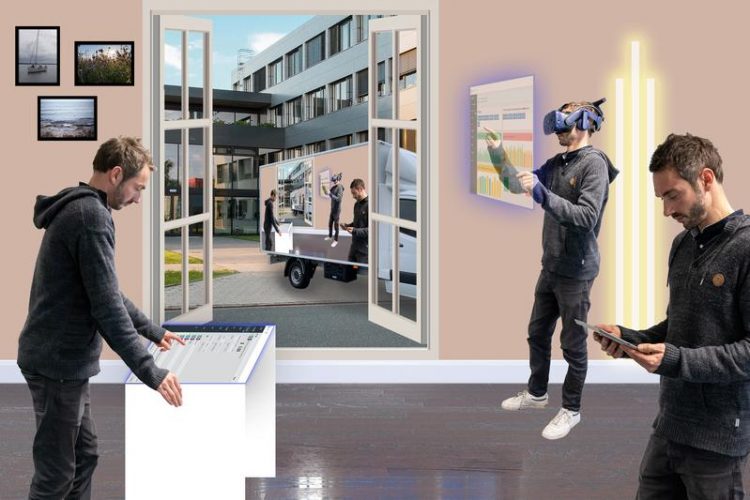Mobile smart homes and expanded living labs: DFKI and TU Berlin make the future of living more accessible

The graphic shows possible technologies used in a stationary and a mobile connected environment. DFKI GmbH, Graphic: Annemarie Popp
Turning one’s own four walls into a smart home is not a matter of the future anymore: speech-controlled assistants, intelligent gadgets and digital locks present numerous possibilities to design a flexible and modern connected living.
However, the available technologies are not only attached to certain costs, but also require technical expertise. This means that people that would especially benefit from a digitalized living environment could be left out – which can also have an impact on the development of new technologies.
In order to focus more on these target groups as well as the wider public in its research on connected living, the German Research Center for Artificial Intelligence (DFKI) and the Technical University of Berlin work on a solution for a more open exchange:
The cooperative, modular, mobile Smart Life Lab (KosmoS) aims at letting people experience the internet of things (IoT) and simultaneously allowing tests in a real-life environment. The project KosmoS is part of the funding programme “Intelligent, connected objects for the everyday life” by the German Federal Ministry of Education and Research (BMBF) and is meant to provide a single connected environment in which all projects can be integrated. The proposed plan is presented to the involved consortia during a networking meeting on Wednesday, 19 February 2020, in Berlin.
Connected living labs for a better dialog with users and target groups
With its funding programme, the BMBF supports different research proposals that concentrate on the benefits of digitalization for people with specific needs – for example in the shape of learning aids for students of assistance systems for seniors. But also topics with a wider application field like the smart textiles of the DFKI projects ConText are funded.
In order to apply, demonstrate and develop the results together with the users, the project KosmoS is creating an infrastructure for connected environments made up of stationary as well as mobile test beds that allow the experience of new technologies independent of the location.
On the one hand, the DFKI research areas Cyber-Physical Systems (CPS) and Interactive Textiles (IT) create a mobile platform consisting of combinable modules with a technical infrastructure that allows the implementation of IoT-technologies.
On the other hand, the Distributed Artificial Intelligence Laboratory (DAI Laboratory) will expand its living lab in the Telefunken building of the TU Berlin in order to let the technologies of the different projects be integrated in a consistent technical structure.
The aspired network of mobile and stationary connected environments also involves the Bremen Ambient Assisted Living Lab of the DFKI research group CPS, led by Prof. Dr. Rolf Drechsler. The new test sites will not only support the dialog with target groups and stakeholders, but also create the unique possibility to examine and optimize the research results in their practical application.
Creating a smart life experience in schools and homes
The mobile platform not only allows the presentation of the technologies at fairs and exhibitions, but also within schools, homes for the elderly and other social institutions. Furthermore, it creates the possibility to conduct practical research, workshops and user tests.
The idea is to use the platform for the involvement of external projects and institutes, the communication of results as well as the creation of synergies for open standards. In addition, the project KosmoS aims at a better participation and improved networking between science and business partners.
Finally yet importantly, the researchers will pay specific attention to matters of data security and questions of sustainability when involving possible user groups.
The first step is the analysis of the requirements for the expansion of the DAI Laboratory, the mobile living lab and the joint infrastructure, followed by a concept phase.
In two years, the mobile modules are put to use and the created living lab environments will be evaluated regarding the defined goals.
Over its runtime of three years, the project KosmoS is funded with roughly 1.1 million Euros by the German Federal Ministry of Education and Research (BMBF).
Photo material:
At https://cloud.dfki.de/owncloud/index.php/s/4ttxoLrWMfBHayq you can find photo material ready for download. You may use the images naming the sources in the document.
Contact:
Dr. Serge Autexier
German Research Center for Artificial Intelligence
Cyber-Physical Systems
Phone: +49 421 218 98 59834
Mail: Serge.Autexier@dfki.de
Press contact:
German Research Center for Artificial Intelligence
Team Corporate Communications Bremen
Phone: +49 421 17845 4180
Mail: uk-hb@dfki.de
Media Contact
All latest news from the category: Architecture and Construction
Newest articles

Silicon Carbide Innovation Alliance to drive industrial-scale semiconductor work
Known for its ability to withstand extreme environments and high voltages, silicon carbide (SiC) is a semiconducting material made up of silicon and carbon atoms arranged into crystals that is…

New SPECT/CT technique shows impressive biomarker identification
…offers increased access for prostate cancer patients. A novel SPECT/CT acquisition method can accurately detect radiopharmaceutical biodistribution in a convenient manner for prostate cancer patients, opening the door for more…

How 3D printers can give robots a soft touch
Soft skin coverings and touch sensors have emerged as a promising feature for robots that are both safer and more intuitive for human interaction, but they are expensive and difficult…





















